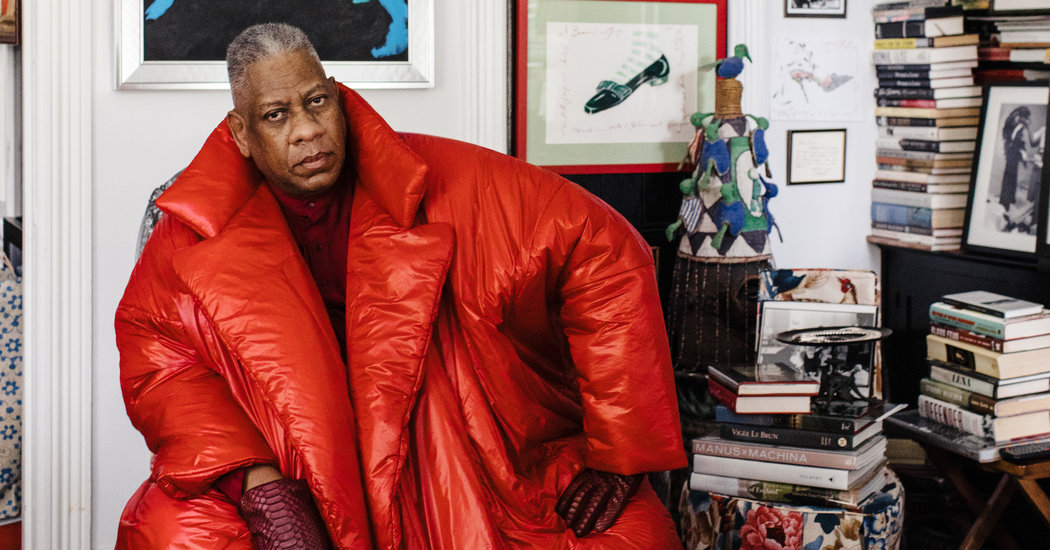Five articles from around The Times, narrated just for you.
This weekend, listen to a collection of narrated articles from around The New York Times, read aloud by the reporters who wrote them.
André Leon Talley, Editor and Fashion Industry Force, Dies at 73
Written by Vanessa Friedman and Jacob Bernstein | Narrated by Vanessa Friedman
André Leon Talley, Editor and Fashion Industry Force, Dies at 73
André Leon Talley, the larger-than-life fashion editor who shattered his industry’s glass ceiling when he went from the Jim Crow South to the front rows of Paris couture, parlaying his encyclopedic knowledge of fashion history and his quick wit into roles as author, public speaker, television personality and curator, died on Tuesday in White Plains, N.Y. He was 73.
Called “The Only One” by The New Yorker by virtue of his being the rare Black editor at the top of a field that was notoriously white and notoriously elitist, Mr. Talley, who stood 6 feet 6 inches tall, was an unmistakable figure everywhere he went. Given to drama in his personal style (he favored capes, gloves and regal headpieces), his pronouncements (“My eyes are starving for beauty”) and the work he adored, he cultivated an air of hauteur, though his friends knew him for his subcutaneous sentimentality.
He was, said the actress and talk-show host Whoopi Goldberg in the 2018 documentary “The Gospel According to André,” “so many things he was not supposed to be.”
Mommy Is Going Away for a While
There are so many ways to do motherhood wrong, or so a mother is told, Amanda Hess, a critic at large for The Times, writes. A mother can be overbearing or remote. She can smother or neglect. She can mother in such a specifically bad way that she is assigned a bad-mom archetype: stage mother, refrigerator mother, “cool mom.” She can hover like a helicopter mom or bully like a bulldozer mom. But the thing she cannot do — the thing that is so taboo it rivals actually murdering her offspring — is leave.
The mother who abandons her children haunts our family narratives. She is made into a lurid tabloid figure, an exotic exception to the common deadbeat father. Or she is sketched into the background of a plot, her absence lending a protagonist a propulsive origin story. This figure arouses our ridicule (consider Meryl Streep’s daffy American president in “Don’t Look Up,” who forgets to save her son as she flees the apocalypse) or our pity (see “Parallel Mothers,” where an actress has ditched her daughter for lousy television parts). But lately the vanishing mother has provoked a fresh response: respect.
◆ ◆ ◆
Marianne Williamson: A Politico or Apolitical?
Written and narrated by Casey Schwartz
Marianne Williamson: A Politico or Apolitical?
After ending her presidential campaign in January 2020, Marianne Williamson moved from New York to Washington, D.C. (by way of Iowa).
The campaign had raised her profile, and earning potential, exponentially. Many Americans had encountered her for the first time, via the persona — the parody version — that quickly enveloped her, that of a crystal-worshiping, antivaccine (this was pre-Covid vaccines), new-age weirdo who would dare talk about love in a political debate. Who would dare to make love the very center of her platform, in fact.
Ms. Williamson moved to Washington to “keep her ear to the ground,” yet she is not willing to say whether she will run for president again. So, the question remains: What will Ms. Williamson do next?
◆ ◆ ◆
Alone With a Basketball, a Hoop and Covid
Written and narrated by Dan Barry
Alone With a Basketball, a Hoop and Covid
In Covid isolation, separated from his family, Dan Barry, a longtime Times reporter and columnist, launched jump shots in the driveway and wondered: Will we ever properly mourn the ones we’ve lost? Will we ever smile again? The answers were hit or miss.
“Basketball, when played alone, is meditation,” Dan writes. “Other people find their inner balance through counseling or running or yoga or tending to tomatoes and cucumbers in the garden. I find it with basketball. Just me, a ball, a hoop. And, now, Covid.”
◆ ◆ ◆
The Hostages Escaped. But Synagogues Ask, How Can They Be More Secure?
Written by Ruth Graham, Jacey Fortin and Troy Closson | Narrated by Ruth Graham
The Hostages Escaped. But Synagogues Ask, How Can They Be More Secure?
For 11 hours, the hostages in a Texas synagogue talked to a ranting gunman, hoping that he would see them as human. They whispered about strategies. And they surreptitiously edged toward the nearest exit.
But when the gunman ordered the men to kneel, they decided they had to take action. The rabbi grabbed a chair and heaved it at the gunman. The hostages ran for the door.
The rabbi, Charlie Cytron-Walker, has been called heroic for his cool head and the decisive leadership that led to the dramatic escape of three hostages on Saturday from Congregation Beth Israel of Colleyville, in suburban Fort Worth, Texas.
But by his own account on Monday, and that of another hostage, Jeffrey Cohen, it was years of security training, prompted by threats to synagogues, that allowed them to escape.
Want to hear more narrated articles from publications like The New York Times? Download Audm for iPhone and Android.
The Times’s narrated articles are made by Tally Abecassis, Parin Behrooz, Anna Diamond, Sarah Diamond, Jack D’Isidoro, Aaron Esposito, Elena Hecht, Adrienne Hurst, Elisheba Ittoop, Emma Kehlbeck, Marion Lozano, Tanya Pérez, Krish Seenivasan, Margaret H. Willison, Kate Winslett, John Woo and Tiana Young. Special thanks to Sam Dolnick, Ryan Wegner, Julia Simon and Desiree Ibekwe.




























